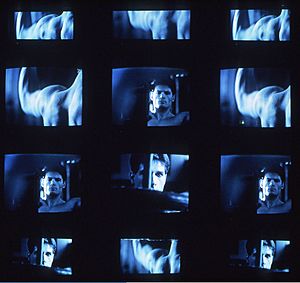Marie-Jo Lafontaine facts for kids
Marie-Jo Lafontaine was born on November 17, 1950. She is a talented artist from Belgium. She creates amazing sculptures and video art. Today, she lives and works in Brussels. She also teaches art as a professor at the Karlsruhe University of Arts and Design.
Marie-Jo Lafontaine grew up in Antwerp, Belgium. She went to art school from 1975 to 1979. She studied at a famous school called l'École nationale supérieure d'architecture et des arts visuels, also known as La Cambre.
Artistic Journey and Style
Marie-Jo Lafontaine uses many different materials in her art.
- She makes "tapestries" by weaving black wool into cool patterns.
- She creates sculptures using materials like plaster, concrete, and lead.
- She also takes photographs.
In 1980, Marie-Jo started using video in her sculptures. She creates special art setups and environments that use video screens. These video installations often show powerful images of people and animals. She explores strong feelings and how people react in different situations.
Awards and Recognition
Marie-Jo Lafontaine has received several important awards for her art:
- In 1977, she won the Prix de la Jeune Peinture Belge (Prize for Young Belgian Painting).
- In 1986, she received a FIACRE grant from the French Ministry of Culture. This helped her continue her artistic work.
- In 1996, she was given the European Photography Award.
Famous Works
One of Marie-Jo Lafontaine's most well-known artworks is called Les larmes d'acier. This piece was created in 1986.
External links
- Learn more about Marie-Jo Lafontaine on the Union List of Artist Names website.
 | Victor J. Glover |
 | Yvonne Cagle |
 | Jeanette Epps |
 | Bernard A. Harris Jr. |


